

Martha Arbogast
Hello! I am a Kindergarten teacher who is interested in learning new strategies to keep my students engaged. I also want to learn more about how to create meaningful PBL's in my classroom.
Project Based Learning. What is PBL?
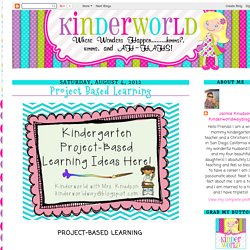
The Buck Institute created this helpful video for teachers. These are some fun PBL projects I have done in my kindergarten class. The Kinders wanted to create an outdoor classroom called The Light Bulb Lab.Watch our part 1 of our video (part 2 is coming soon).Learn more about this project here. Spooky Haunted House In the beginning of the year, we focus on shapes. Step 1: We found cylinders, spheres, cubes, rectangular prisms Step 2: Allow students to glue the objects on the board Step 3: Paint it black. PBL in the Primary Classroom! Kindergarten Project Based Learning. Have you been hearing much about Project Based Learning?
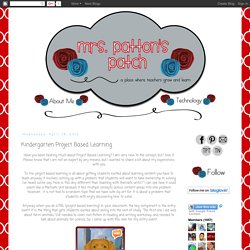
I am very new to the concept, but I love it. Please know that I am not an expert by any means, but I wanted to share a bit about my experiences with you. To me, project based learning is all about getting students excited about learning content you have to teach anyway. It involves coming up with a problem that students will want to take ownership in solving. PBL Ideas for Kindergarten - Stephanie Hairston-Prunty ~ Instructional Coach. Kindergarten Teaching Strategies: Classroom Management During Centers.
Kindergarten {Reading Strategies} on Pinterest. Videos, Common Core Resources And Lesson Plans For Teachers: Teaching Channel. Strategies for Teaching Writing in Kindergarten. Kindergarten students enter the school year with varying levels of ability, especially when it comes to writing.
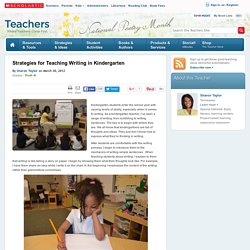
As a kindergarten teacher, I’ve seen a range of writing, from scribbling to writing sentences. The key is to begin with where they are. We all know that kindergartners are full of thoughts and ideas. They just don’t know how to express what they’re thinking in writing. After students are comfortable with the writing process, I begin to introduce them to the mechanics of writing simple sentences. Writing Simple Sentences At the beginning of the school year, I introduce my students to writing simple sentences. Kindergarten Teaching Strategies Shared By A Successful Teacher.
Although kindergarten teaching is not my forte, I have recently consulted with a very good friend and teaching colleague, Valerie, who has been teaching kindergarten for many, many, many years.
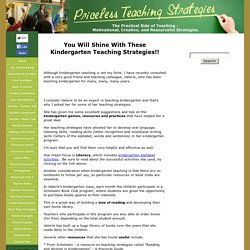
I consider Valerie to be an expert in teaching kindergarten and that's why I asked her for some of her teaching strategies. She has given me some excellent suggestions and tips on the kindergarten games, resources and practices that have helped her a great deal. Her teaching strategies have allowed her to develop oral language, listening skills, reading skills (letter recognition and sound)and writing skills (letters of the alphabet, words and sentences) in her kindergarten program. I'm sure that you will find them very helpful and effective as well. One major focus is Literacy, which includes kindergarten alphabet activities . Teaching Kindergarten Reading Comprehension. Project Based Learning, Kindergarten and Inquiry Based Learning. First Day of Kindergarten: 8 Survival Skills. The first day of kindergarten is busy, busy, busy!
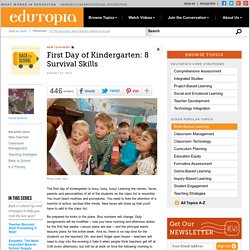
Learning the names, faces, parents and personalities of all of the students on the class list is essential. You must teach routines and procedures. You need to hold the attention of a roomful of active, excited little minds. New faces will show up that you'll have to add to the class list. Be prepared for kinks in the plans. Reading in Kindergarten. Reading is a process of getting meaning from print.
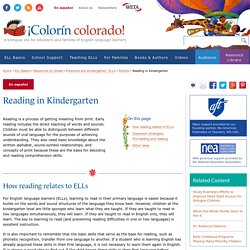
Early reading includes the direct teaching of words and sounds. Children must be able to distinguish between different sounds of oral language for the purposes of achieving understanding. They also need basic knowledge about the written alphabet, sound-symbol relationships, and concepts of print because these are the basis for decoding and reading comprehension skills.
How reading relates to ELLs For English language learners (ELLs), learning to read in their primary language is easier because it builds on the words and sound structures of the language they know best. It is also important to remember that the basic skills that serve as the base for reading, such as phonetic recognition, transfer from one language to another. Kindergarten Entry Assessment (KEA) Kindergarten Entry Assessment (KEA) Michigan's Kindergarten Entry Assessment (KEA) is an authentic observational system (provided by Teaching Strategies GOLD) for assessing children in the first 60 days of kindergarten.
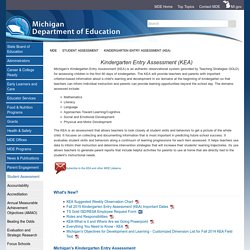
The KEA will provide teachers and parents with important criterion-based information about a child's learning and development in six domains at the beginning of kindergarten so that teachers can inform individual instruction and parents can provide learning opportunities beyond the school day. The domains assessed include: Early Literacy Webinars. The National Center for Learning Disabilities and the Stern Center for Language and Learning are pleased to co-sponsor this series of four Early Literacy Webinars, based on the Stern Center's BUILDING BLOCKS FOR LITERACY® program.
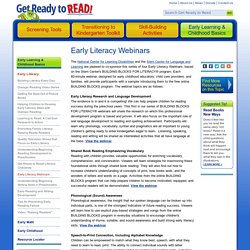
Each 60-minute webinar, designed for early childhood educators, child care providers, and families, will provide participants with a sampler introducing them to the free online BUILDING BLOCKS program. The webinar topics are as follows: Early Childhood Investigations (ECI) Webinars. Webinars for Early Care and Education Professionalsproduced and hosted by Engagement Strategies, LLC The Early Childhood Investigations (ECI) Webinar Series offers free online professional development sessions to early education professionals.
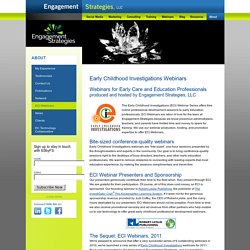
ECI Webinars are labor of love for the team at Engagement Strategies because we know preschool administrators, teachers, and parents have limited time and money to spare for training. We use our webinar production, hosting, and promotion expertise to offer ECI Webinars. Bite-sized conference-quality webinars Early Childhood Investigations webinars are "bite-sized', one-hour sessions presented by the thought-leaders and experts in the community.
Our goal is to bring conference-quality sessions right to the desktops of busy directors, teachers, and other early education professionals. Stay tuned for our new Early Childhood Investigations Webinar website in January, 2010! West Virginia Department of Education. Kindergarten Readiness Checklist. To do well in school, children need to be supported and nurtured in all areas of development.
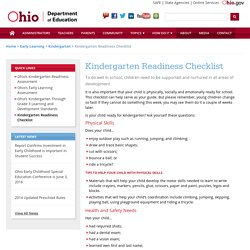
It is also important that your child is physically, socially and emotionally ready for school. This checklist can help serve as your guide. But please remember, young children change so fast! If they cannot do something this week, you may see them do it a couple of weeks later. Kindergarten Readiness Checklist: Is My Child Ready for Kindergarten? Making Learning Fun. Mrs. Ricca's Kindergarten. Education to the Core - Elementary Teacher Blog. KINDERWORLD. EdWeb: A professional online community for educators. Kindergarten Crayons. Kindergarten Tales. Live Love Laugh Everyday In Kindergarten on Pinterest.
Kinderchat. Kinder Craze - A Kindergarten Teaching Blog. Yammer. Yammer is a freemium enterprise social networking service used for private communication within organizations. Access to a Yammer network is determined by a user's Internet domain so that only individuals with approved email addresses may join their respective networks.[2] The service began as an internal communication system for the genealogy website Geni,[3] and was launched as an independent product in 2008.[4] Microsoft later acquired Yammer in 2012 for US$1.2 billion.[5] History[edit] David Sacks, one of the co-founders of Yammer Adam Pisoni, one of the co-founders of Yammer, in 2013.
By April 2010, Yammer CEO Sacks claimed that Yammer revenue was doubling every quarter, but would not disclose revenue figures for 2009 beyond describing it as "seven figures. " On July 24, 2014, Microsoft announced that Yammer development was being moved into the Office 365 development team, and Sacks announced that he was leaving Microsoft and Yammer.[14] See also[edit]